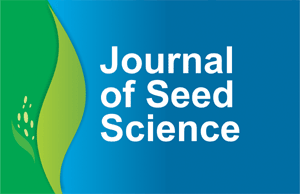Abstract:
Studies on seed maturation directly contribute to obtaining seeds with a higher standard of physical, physiological, and sanitary quality. Thus, the aim of this study was to verify the morphological and physiological changes during the maturation of Cenostigma tocantinum Ducke seeds. The maturation stages were analyzed: I (293 days after anthesis - DAA), II (322 DAA), III (350 DAA), and IV (356 DAA) through visual, biometric analyses, and quantification of moisture content, dry mass, viability, and seed vigor. During the development of C. tocantinum seeds, changes in fruit coloration and an increase in fruit and seed length, width, and thickness were observed. In the initial stages, the seeds had a high moisture content, which decreased in the later stages. On the other hand, the dry mass of the seeds showed an inversely proportional behavior to the moisture content. Physiological variables performed better in stages III and IV, except for electrical conductivity. It can be concluded that C. tocantinum seeds showed superior physiological quality in stages III or IV, recommending the collection of seeds during these maturation periods.
Index terms:
pau-pretinho; physiological quality; seed development; seed maturation

 Thumbnail
Thumbnail
 Thumbnail
Thumbnail
 Thumbnail
Thumbnail
 Thumbnail
Thumbnail
 Thumbnail
Thumbnail
 Thumbnail
Thumbnail
 Thumbnail
Thumbnail






